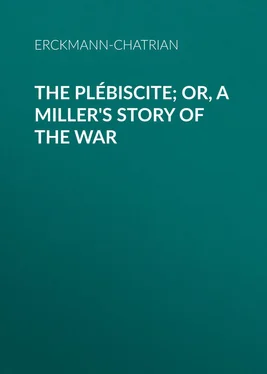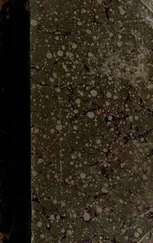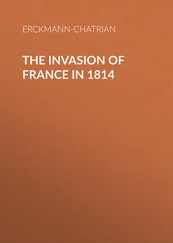Erckmann-Chatrian - The Plébiscite; or, A Miller's Story of the War
Здесь есть возможность читать онлайн «Erckmann-Chatrian - The Plébiscite; or, A Miller's Story of the War» — ознакомительный отрывок электронной книги совершенно бесплатно, а после прочтения отрывка купить полную версию. В некоторых случаях можно слушать аудио, скачать через торрент в формате fb2 и присутствует краткое содержание. Издательство: Иностранный паблик, Жанр: foreign_antique, foreign_prose, Историческая проза, на английском языке. Описание произведения, (предисловие) а так же отзывы посетителей доступны на портале библиотеки ЛибКат.
- Название:The Plébiscite; or, A Miller's Story of the War
- Автор:
- Издательство:Иностранный паблик
- Жанр:
- Год:неизвестен
- ISBN:нет данных
- Рейтинг книги:3 / 5. Голосов: 1
-
Избранное:Добавить в избранное
- Отзывы:
-
Ваша оценка:
- 60
- 1
- 2
- 3
- 4
- 5
The Plébiscite; or, A Miller's Story of the War: краткое содержание, описание и аннотация
Предлагаем к чтению аннотацию, описание, краткое содержание или предисловие (зависит от того, что написал сам автор книги «The Plébiscite; or, A Miller's Story of the War»). Если вы не нашли необходимую информацию о книге — напишите в комментариях, мы постараемся отыскать её.
The Plébiscite; or, A Miller's Story of the War — читать онлайн ознакомительный отрывок
Ниже представлен текст книги, разбитый по страницам. Система сохранения места последней прочитанной страницы, позволяет с удобством читать онлайн бесплатно книгу «The Plébiscite; or, A Miller's Story of the War», без необходимости каждый раз заново искать на чём Вы остановились. Поставьте закладку, и сможете в любой момент перейти на страницу, на которой закончили чтение.
Интервал:
Закладка:
Before coming into our country, George had ordered his house to be whitewashed and painted from top to bottom; he had laid new floors, and replaced the old shingle roof with tiles. Now the paint was dry, the doors and windows stood open day and night; the house could not be robbed, for there was nothing in it. My cousin, seeing that all was right, had just written to his wife that she might bring their goods and chattels with her.
So we started about six in the morning; upon the road the people of Hangeviller, of Metting, and Véchem, and those who were going to market in the town, were singing and shouting "Vive l'Empereur!"
Everywhere they had voted "Yes," for peace. It was the greatest fraud that had ever been perpetrated: by the way in which the Ministers, the prefects, and the Government newspapers had explained the Plébiscite, everybody had imagined that he had really voted peace.
Cousin George hearing this, said, "Oh, you poor country folks, how I pity you for being such imbeciles! How I pity you for believing what these pickpockets tell you!"
That was how he styled the Emperor's government, and naturally I felt my indignation rise; but Catherine's sound advice came back into my mind, and I thought, "Hold your tongue, Christian; don't say a word – that's your best plan."
All along the road we saw the same spectacle; the soldiers of the 84th, garrisoned at Phalsbourg, looked as pleased as men who have won the first prize in a lottery; the colonel declared that the men who did not vote "Yes" would be unworthy of being called Frenchmen. Every man had voted "Yes;" for a good soldier knows nothing but his orders.
So having passed before the gate of France, we came down to the Baraques, and then reached Lützelbourg. The train from Paris had passed a few minutes before; the whistle could yet be heard under the Saverne tunnel.
My cousin's wife, with whom I was not yet acquainted, was standing by her luggage on the platform; and seeing George coming up, she joyfully cried, "Ah! is that you? and here is cousin."
She kissed us both heartily, gazing at us, however, with some surprise, perhaps on account of our blouses and our great wide-brimmed black hats. But no! it could not be that; for Marie Anne Finck was a native of Wasselonne, in Alsace, and the Alsacians have always worn the blouse and wide-brimmed hat as long as I can remember. But this tall, thin woman, with her large brown eyes, as bustling, quick, and active as gunpowder, after having passed thirty years at Paris, having first been cook at Krantheimer's, at a place called the Barrière de Montmartre, and then in five or six other inns in that great city, might well be somewhat astonished at seeing such simple people as we were; and no doubt it also gave her pleasure.
That is my idea.
"The carts are there, wife," cried George, in high spirits. "We will load the biggest with as much furniture as we can, and put the rest upon the smaller one. You will sit in front. There – look up there – that's the Castle of Lützelbourg, and that pretty little wooden house close by, covered all over with vine, that is a châlet, Father Hoffman-Forty's châlet, the distiller of cordials, you know the cordial of Phalsbourg."
He showed her everything.
Then we began to load; that big Yéri, who takes the tickets at the gate and who carries the parcels to Monsieur André's omnibus, comes to lend us a hand. The two carts being loaded about twelve o'clock, and my cousin's wife seated in front of the foremost one upon a truss of straw, we started at a quiet pace for the village, where we arrived about three o'clock. But I remember one thing, which I will not omit to mention. As we were coming out of Lützelbourg, a heavy wagon-load of coal was coming down the hill, a lad of sixteen or seventeen leading the horse by the bridle; at the door of the last house, a little child of five years old, sitting on the ground, was looking at our carts passing by; he was out of the road, he could not be in any one's way, and was sitting there perfectly quiet, when the boy, without any reason, gave him a lash with his whip, which made the child cry aloud.
My cousin's wife saw that.
"Why did that boy strike the child?" she inquired.
"That's a coal-heaver," George answered. "He comes from Sarrebrück. He is a Prussian. He struck the child because he is a French child."
Then my cousin's wife wanted to get down to fall upon the Prussian; she cried to him, "You great coward, you lazy dog, you wicked wretch, come and hit me." And the boy would have come to settle her, if we had not been there to receive him; but he would not trust himself to us, and lashed his horses to get out of our reach, making all haste to pass the bridge, and turning his head round toward us, for fear of being followed.
I thought at the time that Cousin George was wrong in saying this boy had a spite against the French because he was a Prussian; but I learned afterward that he was right, and that the Germans have borne ill-will against us for years without letting us see it – like a set of sulky fellows waiting for a good opportunity to make us feel it.
"It is our good man that we have to thank for this," said George. "The Germans fancy that we have named him Emperor to begin his uncle's tricks again; and now they look upon our Plébiscite as a declaration of war. The joy of our sous-préfets, our mayors, and our curés, and of all those excellent people who only prosper upon the miseries of mankind, proves that they are not very far out."
"Yes, indeed," cried his wife; "but to beat a child, that is cowardly."
"Bah! don't let us think about it," said George. "We shall see much worse things than this; and we shall have deserved it, through our own folly. God grant that I may be mistaken!"
Talking so, we arrived home.
My wife had prepared dinner; there was kissing all round, the acquaintance was made; we all sat round the table, and dined with excellent appetites. Marie Anne was gay; she had already seen their house on her way, and the garden behind it with its rows of gooseberry bushes and the plum-trees full of blossom. The two carts, the horses having been taken out, were standing before their door; and from our windows might be seen the village people examining the furniture with great interest, hovering round and gazing with curiosity upon the great heavy boxes, feeling the bedding, and talking together about this great quantity of goods, just as if it was their own business.
They were remarking no doubt that our cousin George Weber and his wife were rich people, who deserved the respectful consideration of the whole country round; and I myself, before seeing these great chests, should never have dreamed that they could have so much belonging entirely to themselves.
This proved to me that my wife was perfectly right in continuing to pay every respect to my cousin; she had also cautioned our daughter Grédel: as for Jacob, he is a most sensible lad, who thinks of everything and needs not to be told what to do.
But what astonished us a great deal more, was to see arriving about half-past three two other large wagons from the direction of Wéchem, and hearing my cousin cry, "Here comes my wine from Barr!"
Before coming to Rothalp he had himself gone to Barr, in Alsace, to taste the wine and to make his own bargains.
"Come, Christian," said he, rising, "we have no time to lose if we mean to unload before nightfall. Take your pincers and your mallet; you will also fetch ropes and a ladder to let the casks down into the cellar."
Jacob ran to fetch what was wanted, and we all came out together – my wife, my daughter, cousin, and everybody. My man Frantz remained alone at the mill, and immediately they began to undo the boxes, to carry the furniture into the house: chests of drawers, wardrobes, bedsteads, and quantities of plates, dishes, soup-tureens, etc., which were carried straight into the kitchen.
Читать дальшеИнтервал:
Закладка:
Похожие книги на «The Plébiscite; or, A Miller's Story of the War»
Представляем Вашему вниманию похожие книги на «The Plébiscite; or, A Miller's Story of the War» списком для выбора. Мы отобрали схожую по названию и смыслу литературу в надежде предоставить читателям больше вариантов отыскать новые, интересные, ещё непрочитанные произведения.
Обсуждение, отзывы о книге «The Plébiscite; or, A Miller's Story of the War» и просто собственные мнения читателей. Оставьте ваши комментарии, напишите, что Вы думаете о произведении, его смысле или главных героях. Укажите что конкретно понравилось, а что нет, и почему Вы так считаете.












